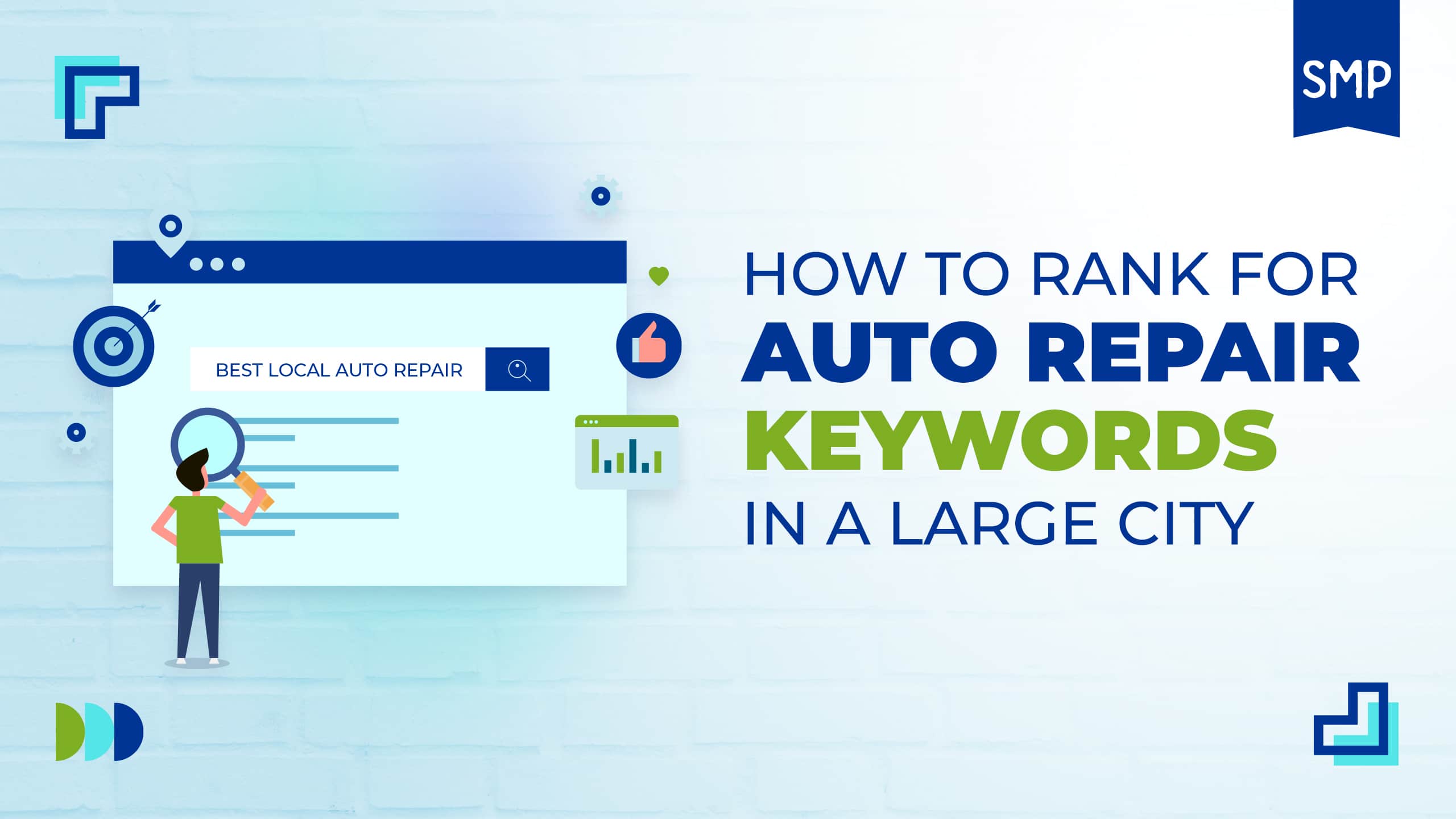There’s a common misconception out there that SEO is SEO is SEO. That’s like saying an oil change is an oil change, and that’s all fine until a Bugatti Veyron pulls into your shop.
The fact is it’s a lot easier to rank for the term “auto repair Fernwood MS” than it is to rank for the term “auto repair Houston TX.” In fact, all you would need to do to rank number one for “auto repair Fernwood MS” would be to open an auto repair shop in Fernwood MS – because there’s not a single auto repair shop in Fernwood right now. Houston, TX, on the other hand, has hundreds of auto repair shops, maybe thousands.
The more auto repair shops you have inside of a concentrated area, the more difficult it’s going to be to rank for terms like “auto repair” and “mechanic near me.”
Then you have the issue of how serious those competitors are about their SEO. Even if you have a relatively small city that only has 30 auto repair shops in it, only 10 of those are going to be listed on “page one” of the search results. I put “page one” in quotes because Google now has continuous scrolling for search results, which absolutely impacts the way people search, but how far are people willing to scroll?
But getting back to how seriously people take their SEO, if you’re in an area that’s saturated with good shop owners who value marketing and are willing to spend money to see their shop listed at the top of the search results, your SEO will be harder.
So because larger cities have more auto repair shops, and because simple math tells us that the more auto repair shops you have in a city, the more good shops that are willing to spend money on SEO will be located there. This adds up to a much more difficult situation when trying to rank for auto repair keywords.
Essential SEO Basics For Auto Repair Shops In Large Cities
You can’t get around the fact that it’s going to be harder to rank an auto repair shop that’s located in a high-competition area, which is what any large city is. But the basics of SEO are still in play.
No matter which tactics you decide to employ, and we’ll get into tactics shortly, you still need to make sure you get the basics in place, and here they are.
- Make sure your Google Business Profile (GBP) is 100% complete and accurate.
- Ask your clients to leave you keyword-rich reviews.
- Post to your GBP regularly.
- Build as many citations, especially niche citations, as possible.
- Build your website into the most comprehensive, authoritative website on the topic of auto repair that exists within your geographic area.
- Answer your client’s questions in writing and in video.
- Build high-quality backlinks from geographically significant or automotive industry websites.
Whether or not this is enough depends on your level of patience. SEO is a game of patience, and you MUST have patience with SEO. But it’s a balancing act because too much patience borders on complacency and it could be costing you money every day.
What Do You Do To Make Things Move Along Faster?
Well, simply… you do more – and you do higher quality – and you do more and higher quality together, not independently.
Let’s look at the basics again.
I know your GBP is 100% complete, but do you have all of the services you perform listed out? And do you have a high-quality keyword-rich description for each?
You have lots of reviews but are you specifically asking your best clients to be descriptive in their reviews? Go read this blog post after you finish reading this one. Don’t sleep on this!
You’re posting to your GBP 2-3 times per month but you could be doing this daily, and it really does make a difference. Most of these posts should link back to your website. You can link to blog posts, specials, service pages, team member bios, or just about anything. Google loves their own properties and they reward you when you use them.
You have all of the citations you can build with data aggregators and buy from citation mills, but have you manually built the niche citations that exist out there like BimmerShops and LRShops? These exist for nearly every brand of car.
Your website is great but is it truly an authority on the topic of auto repair? Does it answer the questions that searchers have when they have auto repair needs? Go read the book, They Ask You Answer and then get to work creating content. But not just any content. The web is full of generic crap that only answers people’s questions at a surface level. Rand Fishkin coined the term “10x Content” knowing that the search engines are in competition with each other to deliver the best search results to searchers. The idea is to create content that’s 10 times better than the current leading piece of content about a particular topic. That’s the kind of content you need to be creating. Feel free to use ChatGPT for ideation and outlining, but write the content yourself using your own words and inserting your thought leadership.
I’m going to shy away from the backlinks discussion because this is one that can hurt you if not done right, and it’s easy to not do it right. If you create great content on your website, backlinks will naturally occur, and naturally occurring backlinks are the ones you want. That being said, backlinks to your website are one of the most powerful tools you can employ to rank a website that’s in a high-competition area. If you want to delve into the art of link building, start here.
My point is this. Just about any time you think you’ve done as much as you can for SEO, you can probably take things a few steps further.
Developing A New Keyword Strategy
The last piece of this puzzle is to think differently when it comes to the keywords you’re targeting. It seems like every shop owner we talk to wants to rank for the terms “auto repair shop” and “mechanic near me,” and if your shop is a generalist shop, you should want to rank for these keywords.
But if your shop is located in a large city or otherwise high-competition area, you need to think about how you can employ “long-tail keywords” or “keyphrases.”
Long-tail keywords are simply longer strings of words that people search for when they’re searching for something in more detail or with more specificity. An example of a regular keyword would be “auto repair shop,” whereas an example of a long-tail keyword would be “auto repair shop that works on cars with the new freon.”
Here are some more examples of long-tail keywords to get your gears turning:
- Subaru timing belt replacement near me
- Best BMW mechanic in Lower Manhattan
- Lighted red dot showing on left side of Jeep Gladiator dashboard
- Auto repair shops that can work on Teslas and are not dealerships
- Mechanics that will come to me
- Shops that can fix my emissions system and accept state vouchers
- Mercedes evaporator core replacement
There are a million of these long-tail keywords that your competitors are not optimizing for because they don’t know better or because they’re lazy. Optimizing for these keywords can bring you a lot of great business that’s easier to sell because the client knows you do this specific repair or service before they even bring you their car. And it’s easier to rank for these keywords because you’re almost certainly the only shop in your area that created content around them.
If you have a great content strategy at your shop you’ll be optimizing your website for long-tail keywords daily without even thinking about it. If you employ video in your marketing you’ll make it even easier because those videos can be turned into so many other types of marketing mediums.
This Does NOT Mean To Ignore Those Primary Keywords
I want to be very clear that I’m not telling you to ignore those primary keywords. Just because they are harder to rank for doesn’t mean that you shouldn’t do the work anyway.
First of all, when you optimize for the long-tail keywords you’ll naturally be optimizing for the primary keywords like “auto repair” and “mechanic.” That’s because Google’s NLP (natural language processing) understands that when you’re talking about working on cars with 1234YF refrigerant that you’re talking about auto repair. We as humans understand that and search engine artificial intelligence does as well.
When you employ long-tail strategy, you’re actually becoming a much better SEO practitioner, and you’ll reap the rewards for it.
Should I Still Do SEO Like This If I’m Not In A High-Competition Area?
Just because you have the luxury that you don’t HAVE to do SEO this way doesn’t mean you shouldn’t. If you’re lazy with your SEO and a new competitor comes into town and they do their SEO the way I’m suggesting here, they will overtake you.
But if you employ these strategies when you don’t have to, it will pay off many times over when you later find yourself in a different position.
Need To Bring In The Pros?
We love seeing shop owners take this knowledge and put it to work in their shops, but if you don’t feel up to the task of doing SEO yourself or if the company you’re currently working with isn’t getting the job done, we’re here to help.
To learn more about what we do, how we do it, and the investment involved, schedule a no-pressure discovery call.


